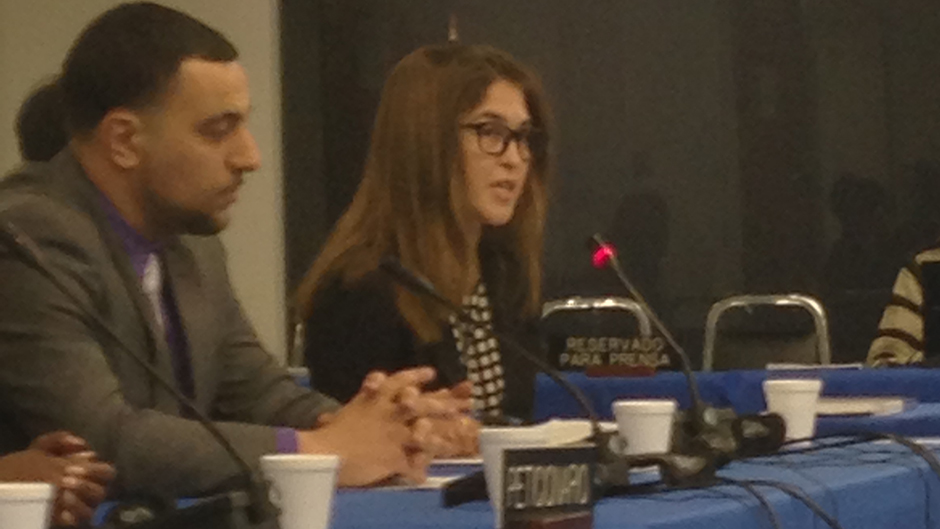Written by: CHARLOTTE CASSEL
On March 26, I was fortunate enough to give the opening remarks at a thematic hearing on the implications of Stand Your Ground (“SYG”) laws in minority communities before the Inter-American Commission on Human Rights (“IACHR”) in Washington, D.C. It was an incredible culmination of a year of hard work in the Human Rights Clinic on Stand your Ground laws, gun violence, and domestic violence.
I represented the Human Rights Clinic at the hearing. We were joined by an incredible delegation of attorneys, advocates, and impacted individuals that included Trayvon Martin’s mother, Sybrina Fulton; Jordan Davis’s father, Ronald Davis; and representatives from the Dream Defenders, Community Justice Project of Florida Legal Services, National Association for the Advancement of Colored People (“NAACP”), and the Free Marissa Now campaign, which focuses on the case of Marissa Alexander.
As a group, we spoke about the proliferation of Stand your Ground laws, and the devastating impact these laws have had on the Martin, Davis, and Alexander families, among others. We also spoke about the ways in which our government—at the federal, state, and local levels—is responsible for protecting people’s fundamental rights as well as ensuring public safety. To hear the testimony of the parents of Trayvon and Jordan was a powerful moment and left a lasting impression on those in the room and those who were watching the live webstream.
It was also important to recognize that despite the proliferation of Stand your Ground laws across the country, much of the focus has been on Florida because of the many high-profile cases here. As Ms. Fulton said, “it started here in Florida and it should end here in Florida.” I agree strongly with her, and as a coalition we will not stop until we achieve justice.
The hearing followed the recent review of the United States by the United Nations Human Rights Committee. During that week, numerous committee members expressed concern that SYG laws in the United States are incompatible with the fundamental right to life, echoing much of the language of a report on domestic violence, gun violence, “Stand Your Ground” laws produced by our team for the committee. I was fortunate to also represent the Human Rights Clinic during the UN review in Geneva.
Building on the momentum from Geneva, the hearing before the Inter-American Commission was perfectly timed. After countless conference calls, meetings, and draft after draft of documents, the day had finally arrived. As we finalized our testimonies, the significance of what we had already achieved hit me. In a few short months we had pulled together local, state, and national advocates, as well as impacted family members to testify before an international human rights tribunal to explain why these laws must ultimately be repealed. Each member of our coalition understood that this would not result in a binding decision, or any immediate change. But we all felt strongly that these laws are one of many broken parts of our criminal justice system. As Mr. Davis stated, “Stand Your Ground all over this country [are] trumping the rights of human rights.”
One member of our coalition – a philosopher – explained to me her frustration with the legal system. She articulated her concern that lawyers are forced to work within the confines of the system, whereas philosophers are trained to think more expansively and ask questions about “what it means.” As I responded to her, I realized I was articulating what we have been learning all semester in the clinic: human rights law and human rights bodies offer a forum to ask the broader questions. They provide those of us who are unsatisfied with domestic law an option to pursue justice elsewhere.
Much as we expected, and nearly verbatim to what was said in Geneva, the statement made by the U.S. government representative at the IACHR hearing indicated that because SYG laws are state law, there was little the federal government could do about them. Although expected, this response was nevertheless frustrating. The federal government can take action—it can conduct civil rights investigations into states whose SYG laws spur civil and human rights violations, or it can condition federal funding to law enforcement on the elimination of SYG provisions. Most important, though, is that it ultimately falls upon the United States government as a whole to ensure that all of its citizens’ fundamental human rights are respected.
Despite the disappointing attitude of the federal government, with the international attention we have brought to the issue of SYG laws, I am confident that through our continued efforts, the U.S. government will be forced to listen. I am grateful to the Inter-American Commission and the United Nations for providing us with an open forum to discuss these laws and highlight the ways in which they discriminate against minority groups and exacerbate an already biased criminal justice system.
Our work is far from over but we now have the world’s attention. When our domestic legal system fails to protect American citizens, we must seek justice elsewhere.

